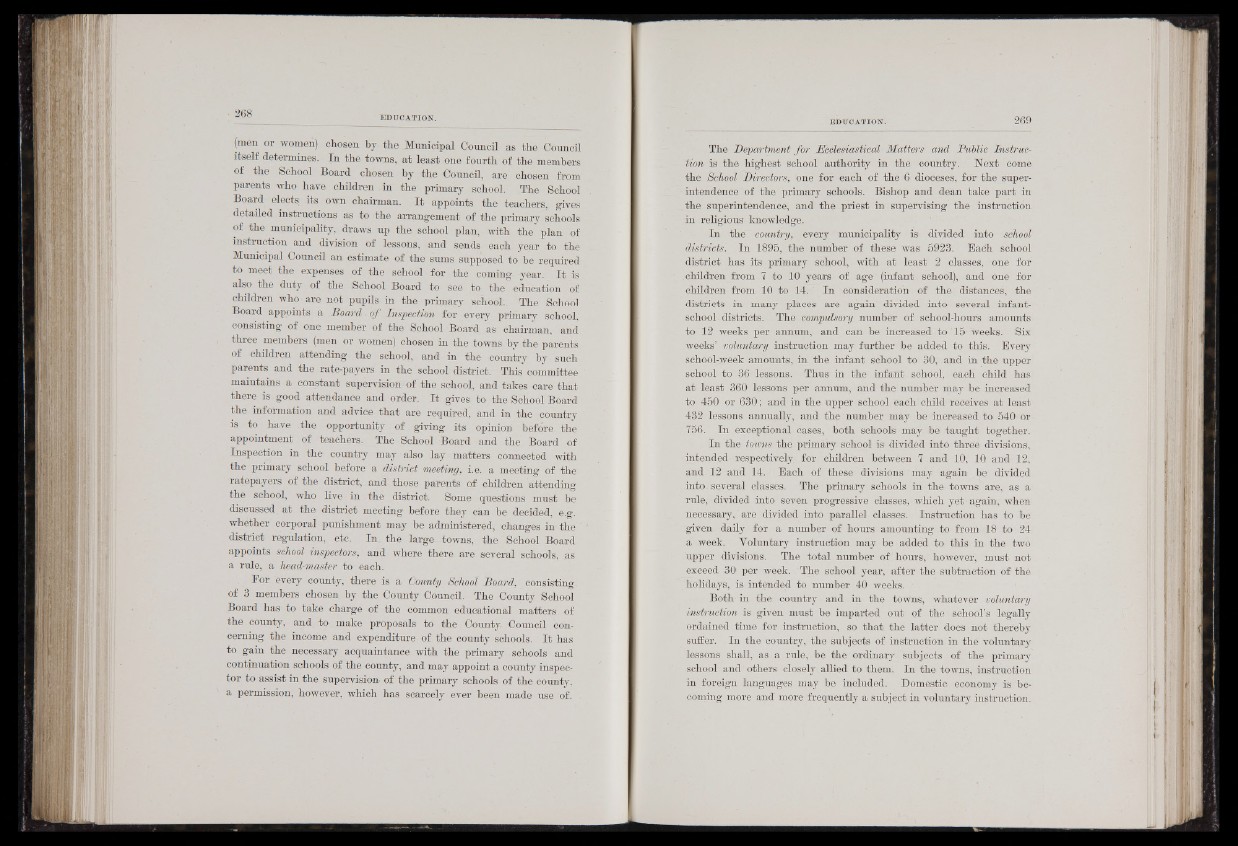
(men or women) chosen by the Municipal Council as the Council
itself determines. In the towns, at least one fourth of the members
of the School Board chosen by the Council, are chosen from
parents who have children in the primary school. The School
Board elects its own chairman. I t appoints the teachers, gives
detailed instructions as to the arrangement of the primary schools
of the municipality, draws up the school plan, with the plan of
instruction and division of lessons, and sends each year to the
Municipal Council an estimate of the sums supposed to be required
to meet the expenses of the school for the coming year. I t is
also the duty of the School Board to see to the education of
children who are not pupils in the primary school: The School
Board appoints a Hoard. of Inspection for every primary school,
consisting of one member of the School Board as Chairman, and
three members (men or women) chosen in the towns bv the parents
of children attending the school, and in the country by such
parents and the rate-payers in the school district. This committee
maintains a constant supervision of the school, and takes care that
there is good attendance and order. I t gives to the School Board
the information and advice that are required, and in the country
is to have the opportunity of giving its opinion before the
appointment of teachers. The School Board and the Board of
Inspection in the country may also lay matters connected with
the primary school before a district meeting, i.e. a meeting of the
ratepayers of the district, and those parents of children attending
the school, who live in the district. Some questions must be
discussed, at the district meeting before they can be decided, e.g.
whether corporal punishment may be administered, changes in the
district regulation, etc. In. the large—towns, the School Board
appoints school inspectors, and where there are several schools, as
a rule, a head-master to each.
For every county, there is a County School Hoard, consisting,
of 3 members chosen by the County Council. The County School
Board has to take charge of the common educational matters of
the county, and to make proposals to the County. Council concerning
the income and expenditure of the county schools. I t has
to gain the necessary acquaintance with the primary schools and
continuation schools of the county, and may appoint a county inspector
to assist in the supervision, of the primary schools of the county,
a permission, however, which has scarcely ever been made use of.
The Department for Ecclesiastical Matters and Public Instruction
is the highest school authority in the country. Next come
the School Directors, one for each of the 6 dioceses, for the superintendence
of the primary schools. Bishop and dean take part in
the superintendence', and the priest in supervising the instruction
in religious knowledge.
In the country, every municipality is divided into school
districts. In 1895, the number of these was 5923. Each school
district has its primary school, with at least 2 classes, one for
children from 7 to 10 years of age (infant school), and one for
children from 10 to 14: ' In consideration of the distances, the
districts in many places are again divided into several infant-
school districts. The compulsory number of school-hours amounts
to 12 weeks per annum, and can be increased to 15'weeks. Six
weeks’ voluntary instruction may further be added to this. Every
school:week amounts, in the infant school to 30, and in the upper
school to 36 lessons. Thus in the infant school, each child has
at least 360 lessons per annum, and the number may be increased
to 450 or 630 ; and in the upper school each child receives at least
432 lessons annually, and the number may be increased to 540 or
756. In exceptional cases, both schools may be taught together.
In the towns the primary school is divided into three divisions,
intended respectively, for children between 7 and 10, IQ and 12,
and 12 and 14. Each of these divisions may again be divided
into, several classes. The primary schools in the towns are, as a
rule, divided into seven progressive classes, which yet again, when
necessary, ' are divided into parallel classes. Instruction has to be
given daily for a number of hours amounting to from 18 to 24
a week. Voluntary instruction may be added to this in the two
upper divisions. The total number of hours, however, must not
exceed 30 per week. The school year, after the subtraction of the
holidays, is intended to number 40 weeks.
Both in the country and in the towns, whatever voluntary
instruction is given must be imparted out of the school’s legally
ordained time for instruction, so that the latter does not thereby
suffer. In the country, the subjects of instruction in the voluntary
lessons shall, as a rule, be the ordinary subjects of the primary
school and others closely allied to them. In the towns, instruction
in foreign languages may be included. Domestic economy is becoming
more and more frequently a subject in voluntary instruction